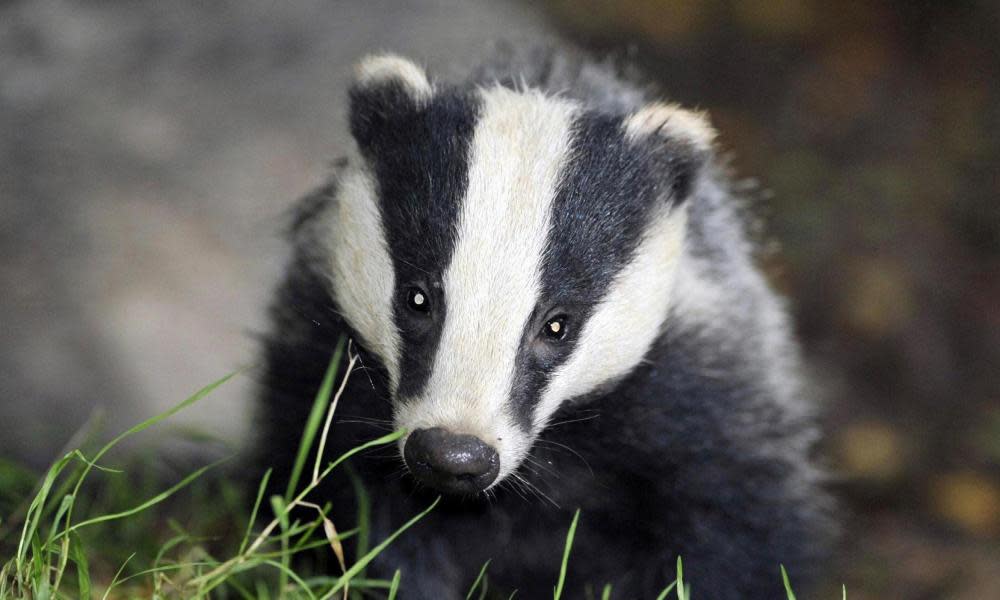Farming industry to blame for TB crisis, not just badgers – report

Frequent trading of cattle and poor biosecurity on farms is “severely hampering” efforts to tackle the crisis of bovine tuberculosis (TB) in England, according to an independent review commissioned by the environment secretary, Michael Gove.
It was wrong to blame badgers as the main cause of the outbreaks, the scientists said, although Gove had told them not to assess whether the current badger culls were working. The scientists did say it was “highly desirable” to move from culling to vaccination of badgers.
TB in cattle costs taxpayers £100m in compensation every year, with 33,000 infected animals slaughtered in 2017. Gove approved a huge expansion of badger culling in September, with up to 42,000 to be shot this year.
The new report is highly critical of both farmers and ministers. Poor use of measures such as secure fencing to prevent TB transmission on farms is “severely hampering disease control measures”, it concluded, as are the 2 million movements of cattle every year as they are bought and sold.
The standard test used misses many infections, meaning diseased cattle are still moved around the country. Furthermore, the review said that TB levels in cattle were not falling: “Current governance arrangements poorly serve bovine TB control.”
Professor Charles Godfray, at Oxford University, led the review and said: “It is wrong to put all the blame on [badgers] and to use this as an excuse not to make hard decisions in the industry, which unfortunately is going to cost them money.”
“We are still concerned about the amount of cattle movements that happen in this country,” said Godfray, who chairs the science advisory council at the environment department. “The number is really high.”
Farming minister George Eustice welcomed the review: “As a government we are committed to eradicating bovine TB and have always been clear that there is no single measure for tackling it. That’s why we have pursued a range of interventions, including cattle movement controls, vaccinations and controlled culling in certain areas.”
To date, the government has spent about £40m on badger culling, with £700,000 offered for badger vaccination over four years.
The government will respond to the review’s recommendations next year, but its summary of the report states: “Industry must take greater responsibility for on-farm controls, biosecurity and safe trading practices to stop the disease spreading.”
The recommendations include what Godfray called “desperately needed” research on the effectiveness of badger vaccination, the potential use of microchips to track cattle movements and the use of a more accurate test in high-risk areas, even if this leads to more false positives.
“The report is very clear that cattle are more likely to acquire TB from other cattle than from badgers,” said Prof Rosie Woodroffe, at the Zoological Society of London and part of an earlier landmark experiment called the Randomised Badger Culling Trial (RBCT), said: “It states repeatedly the desirability of replacing culling with a non-lethal alternative – specifically, it emphasises the need for a proper evaluation of badger vaccination.”
Prof John Krebs, at the University of Oxford and who commissioned the RBCT, said: “The report is a valuable, impartial summary of the current evidence. Unless the government and the farming industry now tackle [biosecurity, trading of infected cattle and testing], TB will not be eradicated or controlled.”
Stuart Roberts, from the National Farmers Union (NFU), said: “The NFU wishes to see the eradication of bovine TB as quickly as possible while retaining a viable cattle industry. To tackle this disease it is crucial that we use every tool available to us.”
He said that farmers were already improving biosecurity but were often unsure which measures worked best, and that the NFU supported making more information on TB risk available to cattle buyers.
However, wildlife groups called for the badger cull to end. The Badger Trust’s Dominic Dyer said: “The badger cull is a disastrous policy that is failing farmers, taxpayers and badgers. It’s time to stop playing the badger blame game and bring this cruel, costly and ineffective policy to an end.”
In September, Eustice said data from badger culls that began in 2013 showed the government’s strategy was “delivering results”. However, the report containing the data stated “these data alone cannot demonstrate whether the badger control policy is effective”. On Monday, some vets accused ministers of telling “barefaced lies” on the issue.
The new review said badger culling based on RBCT methods could deliver “modest” reductions in TB, though critics say the new culls have been set “ridiculously easy” targets.
Godfray said: “There are passionately held, irreconcilable differences between people who believe it is unconscionable to kill wildlife such as badgers and those that believe it is absolutely necessary. It is not a science decision – it has to be made by ministers.”

 Yahoo News
Yahoo News 
